16 The Job Market

There is nothing more exciting than getting your first job in broadcast journalism. Actually, there are probably a number of things more exciting, but it’s up there. The way you get started depends on the position you want. The different roles within a newsroom: reporter, producer and photographer, among others, each have different paths, requirements and responsibilities, but the different positions each share a few things in common.
Television Markets
The United States’ local news areas are split into classifications called Designated Market Areas (DMA) or Area of Direct Influence (ADI). The DMA outlines the area in which a station’s broadcasted television signal can reach. Cable has blurred these lines a bit, and national outlets’ DMA envelops the entire country (or at least the country that can receive the broadcast).
Radio and TV do not share the same signal boundaries but overlap. For example, the state of Utah’s television DMA includes the entire state and border areas of surrounding states, all the way to Elko in Nevada. Radio markets in Utah are separate for the Southern, Central, Northern, and Salt Lake City areas.
The more people in your ADI who see your signal, the more your station can charge for its advertising space, and the more money everyone makes. Markets are ranked in size, based upon the number of television homes within the market. Typically, the higher the market, the more money you can earn. However, there are plenty of exceptions due to differing costs of living and station philosophies, but the market size can act as an estimated earnings guide for you.
Currently, the largest market in the United States is New York, with Los Angeles at number two and Chicago, three. The rankings go all the way down to Glendive, Montana at 210.
Getting Started
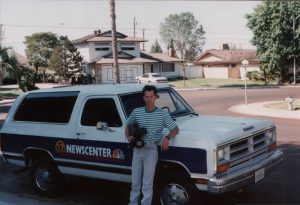
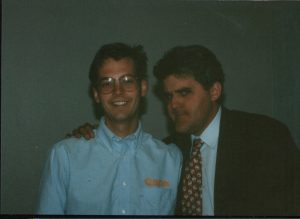
Some highlights from my first TV job at KGET: My first take-home vehicle, and my first celebrity interview. This was the last time I brought a film camera to a celebrity video shoot; it’s a rookie move. Jay Leno was accommodating and a nice guy.
The best and most common career advice is to start in a small market. I began in the Bakersfield, California market, ranked 141 at the time. It has since moved up to 126 because of population growth. In a smaller market, you can make your early-career mistakes with lighter consequences, then move on, leaving them behind you.
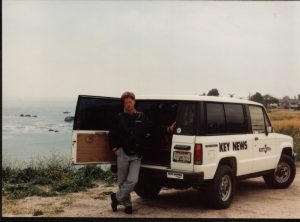
Me and my second take-home vehicle at KEYT, taken along the California Central Coast. I was able to try surfing before my shifts in December, but paying coastal rent on a small-market salary was tough.
Do not be afraid to move. You can live in interesting parts of the country for a few years before you settle in on one place. I have worked in Bakersfield (141), Santa Barbara County (111), and Sacramento (19) in California; then the Utah County area of Utah (30). They called my office the Utah County Bureau, but we traveled all the way from Lehi to Mesquite, Nevada for stories.
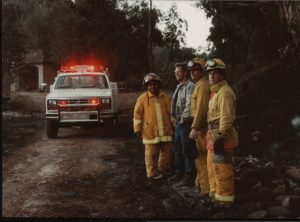
At KEYT I was on call for a bigger section of the coast than any other crew. This is at a Saturday morning fire in Sisquoc.
Successful photographer Emily Landeen has lived in Charleston, South Carolina, Anchorage, Alaska, and Seattle, Washington. She is the outdoors-type, so she was often at the beach in South Carolina; she stayed up for the Northern Lights in Alaska, and is now hiking the Pacific Northwest. Find her on Facebook to see some beautiful nature shots with accompanying text admiring the scenery. Who knows if or where she’ll settle down, but she’s having a great time living in diverse places.
If you are married or committed to another person, moving is not as simple. I met my wife in my second market (Santa Barbara), and kids came along at the third job (Sacramento). When we moved to Utah, the oldest was in third grade, which is typically not a tough transitional time for a kid. The roughest move on the family was when I left full-time TV news to move to Northern Utah and teach.
Starting in bigger markets is a rare exception. Plan on a couple of years in a smaller market instead. You will learn much and make friends you will have the rest of your life, unless you’re a jerk or something.
Stay on Track
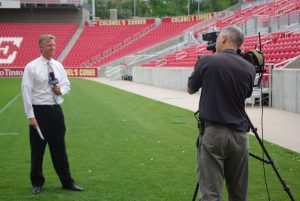
If you want to be a reporter, as this is the path to take if you want to become an anchor, take reporter jobs as they come. Start in a smaller market and work your way up with reporter jobs. Don’t take a desk job and then bug management to let you report. In every instance I know where wanna-be reporters took other jobs to get them in the door at a larger station, it would have been a faster path to reporting there if they took a reporter job in a smaller market first. Paying your dues is worth it. You’ll be doing what you want, and you won’t drive your co-workers and management crazy because you’re doing a job you don’t like.
Internships
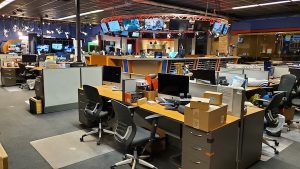
Getting a foot in the door might require offering your services for free. Many successful careers have started with or as an internship. You might also get into the newsroom routine and discover it’s not for you.
Some universities place students in internships with network outlets in New York. It must be prestigious and exciting to be in New York, but the likelihood of you doing a job similar to what you did on your internship is slim. The likelihood of building networked connections is limited because those people are already sitting on top and aren’t likely to move. The likelihood of skills you learned on the internship impressing a potential future employer is also slim. The likelihood of you getting a job offer from that network at the end of your internship is slimmest of all.
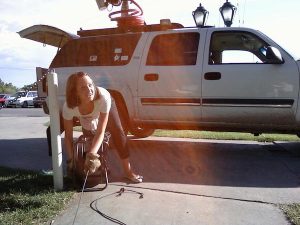
I know of several students whose internships ended with job offers. This gets more common as the market gets smaller. In smaller markets, you are more likely to be trusted to do more jobs and get real experience.
Emily Landeen interned at Salt Lake City NBC affiliate, KSL. Her gung-ho attitude got her up to speed with her shooting basics early in the internship. She earned the trust of her supervisors. They gave her a smaller camera and let her shoot stories on her own that eventually aired on live TV. The posting for her first job in Charleston, South Carolina, asked for one year of shooting experience, but she was hired straight out of school thanks to the experience she picked up at KSL.
If you do not receive a job offer, you have at least gotten experience and established a network through your internship. Reporter Katherine May interned in Idaho Falls, Idaho, where she impressed the person working at the assignment desk. Later, that person was in Boise, Idaho, where Katherine applied for and got a job.
The trick is to make the right impression. Treat your internship as a 150-hour job interview. Dress like you would for a job interview every day. They may tell you casual dress is OK; DRESS FULLY PROFESSIONAL EVERY DAY. They may tell you you can leave early, but it’s a trick; NEVER LEAVE EARLY. They may tell you there is nothing to do for a while; ASK WHAT YOU CAN DO OR LEARN. You may have another job or class competing with the internship, in which case, set up hours they know they can rely on you to be there. Staffers may complain about the hours, one of their co-workers, or an assigned story; NEVER COMPLAIN ABOUT ANYTHING. Whatever you are asked to do that is legal and ethical, SMILE and do it cheerfully. Ask questions when and where appropriate, but know that sometimes reporters, producers, and the assignment desk staff may be too busy for you. Try to get a sense of when things slow down and ask then.
THE INTERNSHIP IS A 150-HOUR JOB INTERVIEW. Do more than the minimum, ALWAYS. I am conservative with my use of all caps, so please take those capitalized guidelines seriously.
Applying for Jobs
As mentioned earlier, the application process is different for specific jobs. Here is a list of jobs and the common application methods:
Photographers – Submit three or four of your best stories via web link, usually YouTube. Use a common resume but have a cover letter that says why you want to work in that market and at that station. When I hired photographers, I looked for a link to our area, preferably family nearby. Title your reel, “NAME Photographer Demo Reel” to make it searchable. List any awards on your resume, and if they’re a really big deal, put them in your cover letter.
I know of several students who were contacted by stations unexpectedly based on their online reels. Keep the clip updated with your best stories and keep your old embarrassing stuff or family videos under a different username and/or channel. Skip the rock and roll montages unless you’re looking for a job making rock and roll montages. Start your reel with your contact information (just email is OK since this is online) for a couple of seconds.
Reporters – Follow the same guidelines for photographers, but add a montage of your creative stand-ups and/or live shots at the beginning. The first few seconds are critical, so show some creative work. This is not the time for thumbsucker standups. You can include any anchoring at the end of the reel or in another online clip. Title your reel, “NAME TV Reporter Demo Reel.”
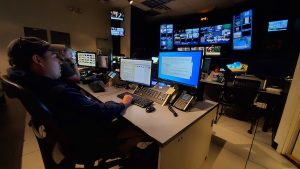
Producers – Submit a show you’ve produced with the commercial breaks removed. When a reporter package or long live shot begins, show just the first and last few seconds. You may also highly abbreviate weather and sports since producers usually have little involvement in them. Title your online reel, “NAME News Producer Demo Reel.” If you have never produced a show on your own, you may be asked for writing samples. Follow the same resume and cover letter guidelines for photographers.
Sports Reporters – Same guidelines as reporters, including keeping it creative. A graduate of mine used a viewer-discretion-advised-style graphic in his sports highlights during a student-news sportscast, and it caught the attention of the management and he got the job. Title your reel, “NAME TV Sports Demo Reel.”
Assignment Desk – This job requires an ability to multitask, teamwork, phones and police scanners. KTVX News Director George Severson said he likes, “resumes that could include examples of social media and online/digital writing examples … like a portfolio.”
Promotions – Provide a reel and samples. Title your online reel, “NAME TV News Promotions Demo Reel” and follow the common guidelines above.
Weather – It’s a given that your resume will have all of your certifications and degrees. Title your unique reel, “NAME Weather Reel.” Provide a mix of anchoring weather segments and reporting samples.
Follow Their Rules
Most postings will tell you how to apply for the job. If it says no phone calls, do not call. Many applications are routed through a human resources department. Don’t worry about this: If the station is advertising a job, they want to fill it, and they will look at the submissions. If you have a connection at the station, of course you can and should use it. Drop names in your cover letter, but make sure those people will speak highly of you. Some managers may call the day you submit, others not. When in California I applied at two stations at the same time. The first station called me to ask for another tape with samples of my work, which I shipped and they then arranged to fly me out for an interview. They made me an offer, which I accepted. I told them I could report in three weeks. After working at that station a week or so, the second station called me to tell me they liked my tape. We all work on our own timelines.

